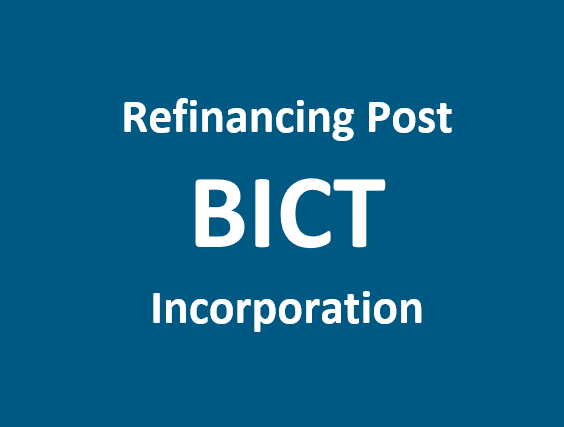
11:11 AM, 23rd November 2018, About 5 years ago
Text Size
Landlords who have incorporated their rental property business using the BICT structure have done so in order to retain competitive mortgages terms and/or avoid or defer the costs of refinancing. However, it is almost inevitable that refinancing will need to be considered at some point for the following reasons:
State Bank of India is offering a rate of 3.59% fixed for five years.
Loans are stress tested at 125% interest cover using the 3.59% pay rate.
This means affordability is calculated based on a maximum of 267.4 times the monthly rent, providing the maximum LTV is not exceeded for individual applications. This is not to be confused with the general stress testing criteria used by their underwriters to consider the viability of the business as a whole, which applies a stress test of 125% interest cover assuming a 5% notional rate. On a simplified basis, this means that the maximum amount of funding the company can have as a whole, including mortgages with other lenders, is restricted to 192 times monthly rent.
The lender’s arrangement fee is 1.25% of the advance and can be added to the loan. Early Repayment Charges (“ERC’s”) are 4% in the first two years, 3% in years three and four, then 2% in the final year of the fixed rate. Thereafter, there are no penalties.
Interest only terms are up to 25 years and the product is available in England and Wales only.
The minimum property value inside London £150,000 or for properties outside London the minimum value figure is £75,000.
The maximum LTV on loans up to £500,000 is 75%. Thereafter, LTV is restricted to 70% of value if the mortgage amount required exceeds £500,000 and up to £1,000,000, then 60% where mortgages on each property are between £1,000,000 and £1,500,000. Thereafter, the maximum LTV for each mortgage is 50% LTV and the maximum single loan is £3,000,000.
Metrobank are offering 3.69% fixed for five years at a stress test of 125% interest cover at a notional rate of 5%.
This means affordability is calculated based on a maximum of 192 times the monthly rent, providing the maximum 75% LTV is not exceeded for individual applications. However, there is also a general stress testing criteria applied by their underwriters too, again to consider the viability of the business as a whole, which uses a stress test of 125% interest cover assuming a 5.5% notional rate. On a simplified basis, this means that the maximum amount of funding the company can have as a whole, including mortgages with other lenders, is restricted to 174.54 times monthly rent.
The lenders arrangement fee is 1.5% and can be added to the advance.
ERC’s start at 5% in year one and reduce by 1% a year thereafter. However, over-payments up to 10% of the loan balance are allowed without penalty.
Interest only terms are up to 25 years and the product is available only in the Midlands and South East, but stretching as far West as Bristol in some instances.
The minimum property value is £75,000 regardless of location and the maximum loan on a property is 75% up to £2,000,000 of loan.
Mortgage lending has never been more complicated
I thought mortgage lending was difficult in the late 80’s and early 90’s when BTL lending didn’t exist and all financing to purchase rental properties was considered on a commercial basis. From 1996 through to the credit crisis it was possible to submit mortgage applications online and receive an instant acceptance in principle and a formal offer within a few weeks. That has all changed since the PRA affordability rules came into play, which has resulted in the role of a competent commercial finance broker never being more important.
One mortgage brokerage we work closely with has gone the extra mile to ensure mortgage lender credit committees are fully up to speed with the underwriting of loans post BICT incorporation.
When a rental property business is incorporated using the BICT structure the beneficial interest in the whole business is transferred at full market value in exchange for shares. This meets the relevant criteria for claiming incorporation relief to roll capital gains into the company shares under TCGA92/S162.
Upon completion of any refinancing it is necessary for the legal title of the properties provided as security for the new finance to be reunited with beneficial ownership of the business to perfect the new mortgage lenders security. This transaction occurs at £nil value on the basis that the economic beneficial ownership has already been transferred at full market value.
Ordinarily this would create a headache for mortgage lenders, because lending criteria is usually based on the lower of X% of purchase price or valuation. In a post BICT refinancing scenario the conveyance of the legal title is reported as £nil value. Any percentage of that is still £nil, meaning that ordinarily the maximum loan would also be £nil. For these reasons it is imperative for the mortgage lenders to understand that:-
It is equally as important for the conveyancing solicitor acting for the borrower and the lender to understand and correctly report new refinancing transactions as it is for the lender and the broker to understand the transactions fully.
One mortgage brokerage firm which has taken the time understand the BICT incorporation strategy fully is now enjoying the fruits of its efforts, because they are now highly regarded as experts in this field by mortgage lenders and are the only brokerage Cotswold Barristers recommend to landlords who are looking to refinance post BICT incorporation
That mortgage brokerage is Brooklands Commercial Finance, a member of the National Association of Commercial Finance Brokers “NACFB”.
Previous Article
Selling Fast! - 3 & 4 bed houses close to Liverpool